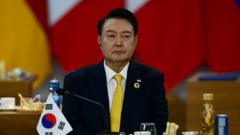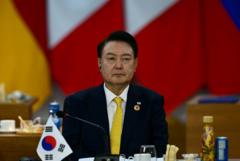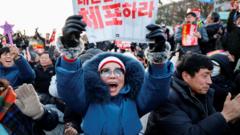As delegates from over 170 countries convene in Busan, South Korea, to negotiate a treaty aimed at addressing plastic waste, Saudi Arabia's resistance highlights the tensions between environmental initiatives and the oil industry. The world's largest oil exporter has been criticized for its efforts to obstruct measures that seek to limit excessive plastic production and phase out harmful chemicals in plastics. Saudi officials contend that such measures unfairly target industries without addressing the core issue of plastic pollution.
**Saudi Arabia's Role in Controversy Over Global Plastic Pollution Treaty**

**Saudi Arabia's Role in Controversy Over Global Plastic Pollution Treaty**
In a clash of interests, Saudi Arabia emerges as a key player opposing global efforts to curb plastic pollution through a UN treaty.
Through procedural delays and demands for unanimous decision-making, Saudi Arabia's stance may hinder progress on what could become a landmark agreement. While environmental organizations advocate for immediate action to combat plastic waste, Saudi interests reflect a broader conflict between economic and ecological priorities.
Saudi Arabia's Actions at UN Talks Focus on Blocking Plastic Treaty
As negotiations unfold, Saudi delegates are actively working to influence the treaty's provisions related to financing and chemical regulations.
A significant meeting in Busan, South Korea, highlighted the growing rift between oil-producing nations and the push for a global plastic treaty. Critics accuse Saudi Arabia, alongside Russia and other petroleum stakeholders, of using tactics to undermine agreements that would impose restrictions on plastic production or eliminate toxic chemicals linked to plastics. This has raised concerns among environmental advocates who argue that addressing pollution necessitates curbing the industry's influence.
Reports from the negotiations indicate that the Saudi delegation is advocating for the removal of key provisions in the treaty and insists on a unanimous decision-making process, which some view as an attempt to stall proceedings. By framing their arguments around the notion of penalizing industries, Saudi leaders reinforce the complex intersection of ecological integrity and economic survival that defines the ongoing discussions on global plastic management.
Saudi Arabia's Actions at UN Talks Focus on Blocking Plastic Treaty
As negotiations unfold, Saudi delegates are actively working to influence the treaty's provisions related to financing and chemical regulations.
A significant meeting in Busan, South Korea, highlighted the growing rift between oil-producing nations and the push for a global plastic treaty. Critics accuse Saudi Arabia, alongside Russia and other petroleum stakeholders, of using tactics to undermine agreements that would impose restrictions on plastic production or eliminate toxic chemicals linked to plastics. This has raised concerns among environmental advocates who argue that addressing pollution necessitates curbing the industry's influence.
Reports from the negotiations indicate that the Saudi delegation is advocating for the removal of key provisions in the treaty and insists on a unanimous decision-making process, which some view as an attempt to stall proceedings. By framing their arguments around the notion of penalizing industries, Saudi leaders reinforce the complex intersection of ecological integrity and economic survival that defines the ongoing discussions on global plastic management.




















